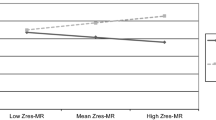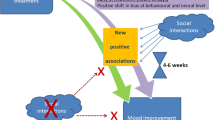Abstract
Several recent studies have suggested that negative patterns of thinking are not predictive of future depression. Such conclusions are inconsistent with some current theories of depression (e.g., Abramson, Seligman, & Teasdale, 1978; Beck, 1976; Ellis & Harper, 1975) that assign a major causal role to cognitions. In the present article some possible reasons for the null findings are discussed. First, it is suggested that individuals who are vulnerable to depression may differ from other persons by having highly negativistic thinking patterns, but that these patterns may be latent and less cognitively accessible than neutral or even positively valenced thinking patterns, except when it happens that the negativistic cognitions have been primed by situations (e.g., failure) analogous to the original situations in which they were learned. One important implication of these views concerns the type of testing situation in which responses to measures of an “insidious” cognitive style or negativistic thinking patterns will be most predictive of naturally occurring depression. Second, it is suggested that further attention needs to be given to certain measurement considerations that have proven important in the broader field of personality (e.g., Epstein, 1979).
Similar content being viewed by others
References
Abramson, L. Y., Seligman, M. E. P., & Teasdale, J. D. (1978). Learned helplessness in humans: Critique and reformulation.Journal of Abnormal Psychology, 87 49–74.
Beck, A. T. (1967).Depression. New York: Hober Medical.
Beck, A. T. (1976).Cognitive therapy and the emotional disorders. New York: International Universities Press.
Beck, A. T., & Rush, A. J. (1981). Cognitive approaches to depression and suicide. In G. Serban (Ed.),Cognitive deficits in the development of mental illness. New York: Brunner/Mazel.
Bem, D. J., & Allen, A. (1974). On predicting some of the people some of the time: The search for cross-situational consistencies in behavior.Psychological Review, 81 506–520.
Breslow, R., Kocsis, J., & Belkin, B. (1981). Contribution of the depressive perspective to memory function in depression.American Journal of Psychiatry, 138 227–230.
Byrne, D. (1964). Repression-sensitization as a dimension of personality. In B. A. Maher (Ed.),Progress in experimental personality research (Vol. 1). New York: Academic Press.
Clark, D. M., & Teasdale, J. D. (1982). Diurnal variation in clinical depression and accessibility of memories of positive and negative experiences.Journal of Abnormal Psychology, 91, 87–95.
DeMonbreun, B. G., & Craighead, W. E. (1977). Distortion of perception and recall of positive and neutral feedback in depression.Cognitive Therapy and Research, 1 311–329.
Ellis, A., & Harper, R. A (1975).A new guide to rational living. North Hollywood: Hal Leighton.
Epstein, S. (1979). The stability of behavior: I. On predicting most of the people much of the time.Journal of Personality and Social Psychology, 37 1197–1126.
Geller, V., & Shaver, P. (1976). The cognitive consequences of self-awareness.Journal of Experimental and Social Psychology, 12, 438–445.
Golin, S., Sweeney, P. D., & Shaeffer, D. E. (1981). The causality of causal attributions in depression: A crossed-lagged panel correlational analysis.Journal of Abnormal Psychology, 90 14–22.
Higgins, E. T., & King, G. (1980). Accessibility of social constructs: Information processing consequences of individual and contextual variability. In N. Cantor & J. F. Kihlstrom (Eds.),Cognition, social interaction, and personality. Hillsdale, New Jersey: Erlbaum.
Higgins, E. T., Rholes, W. S., & Jones, C. R. (1977). Category accessibility and impression formation.Journal of Experimental Social Psychology, 13 141–154.
Isen, A. M., Shalker, T. E., Clark, M., & Karp, L. (1978). Affect, accessibility of material in memory, and behavior: A cognitive loop?Journal of Personality and Social Psychology, 36 1–12.
Janoff-Bulman, R. (1979). Characterological versus behavioral self-blame: Inquiries into depression and rape.Journal of Personality and Social Psychology, 37, 1798–1809.
Kovacs, M., & Beck, A. T. (1978). Maladaptive cognitive structures in depression.American Journal of Psychiatry, 135 525–533.
Lewinsohn, P. M., Steinmetz, J. L., Larson, D. W., & Franklin, J. (1981). Depression-related cognitions: Antecedent or consequence?Journal of Abnormal Psychology, 90, 213–218.
Lloyd, G. G., & Lishman, W. A. (1975). Effects of depression on the speed of recall of pleasant and unpleasant experiences.Psychological Medicine, 5, 173–180.
Loeb, A., Beck, A. T., & Diggory, J. (1971). Differential effects of success and failure on depressed and nondepressed patients.Journal of Nervous and Mental Disease, 152 106–114.
Metalsky, G. I., Abramson, L. Y., Semmel, A., Seligman, M. E. P., & Peterson, C. (1980).Attributional style and the emotional response to negative events: A test of the reformulated model of learned helplessness and depression. Unpublished manuscript, State University of New York at Stony Brook.
Miller, W. R. (1975). Psychological deficit in depression.Psychological Bulletin, 82 238–260.
Peterson, C., Schwartz, S. M., & Seligman, M. E. P. (1981). Self-blame and depression symptoms.Journal of Personality and Social Psychology, 41, 253–259.
Postman, L., & Brown, D. R. (1952). Percepted consequences of success and failure.Journal of Abnormal and Social Psychology, 47, 213–221.
Pryor, J. B., & Kriss, M. (1977). The cognitive dynamics of salience in the attribution process.Journal of Personality and Social Psychology, 35 49–55.
Riskind, J. H., Rholes, W. S., & Eggers, J. (1982). The Velten Mood Induction Procedure: Effects on mood and memory.Journal of Consulting and Consulting and Clinical Psychology, 50 146–147.
Smith, S. M. (1979). Remembering in and out of context.Journal of Experimental Psychology, 5 460–471.
Smith, S. M., Glenberg, A. M., & Bjork, R. A. (1978). Environmental context and human memory.Memory and Cognition, 6 342–353.
Snyder, M., & White, P. (1982). Mood and memories: Elation, depression, and the remembering of the events of one's life.Journal of Personality, 42, 221–238.
Srull, T. K., & Wyer, R. S. (1980). The role of category accessibility in the interpretation of information about persons: Some determinants and implications.Journal of Personality and Social Psychology, 38, 841–856.
Teasdale, J. D., & Fogarty, S. J. (1979). Differential effects of induced mood on retrieval of pleasant and unpleasant events from episodic memory.Journal of Abnormal Psychology, 88 248–257.
Teasdale, J. D., & Taylor, R. (1981) Induced mood and accessibility of memories: An effect of mood state or of inductio procedure?British Journal of Clinical Psychology, 20, 39–48.
Tulving, E., & Thomson, D. (1973). Encoding specificity and retrieval process in episodic memory.Psychological Review, 80, 352–373.
Tversky, A., & Kahneman, D. (1973). Availability: A heuristic for judging frequency and probability.Cognitive Psychology, 5, 207–232.
Weintraub, M., Segal, R., & Beck, A. T. (1974). An investigation of cognition and affect in normal men.Journal of Consulting and Clinical Psychology, 42, 911.
Wilkinson, I. M., & Blackburn, I. M. (1981). Cognitive style in depressed and recovered depressed patients.British Journal of Clinical Psychology, 20 283–292.
Author information
Authors and Affiliations
Additional information
Order of authorship was determined by a random process. The authors assume equal responsibility for this paper. The authors wish to thank Emily Davidson, Jeff Kern, Charlene Muehlenhard, Jack Nation, Steve Smith, Dave Wilson, and anonymous reviewers for their helpful comments on an earlier drift of this article.
Rights and permissions
About this article
Cite this article
Riskind, J.H., Rholes, W.S. Cognitive accessibility and the capacity of cognitions to predict future depression: A theoretical note. Cogn Ther Res 8, 1–12 (1984). https://doi.org/10.1007/BF01315092
Issue Date:
DOI: https://doi.org/10.1007/BF01315092




